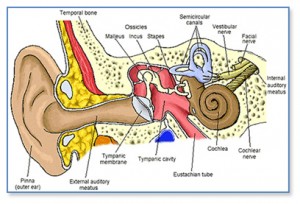Understanding and Protecting Your Hearing
Your hearing is a gift that should be valued and protected. While anyone at any age can experience hearing loss, there are steps you can take to protect your hearing. The first step begins with understanding how your hearing works.
How Hearing Works
 Your ear is composed of three parts, your outer ear, middle ear and inner ear. Sound is processed in three steps:
Your ear is composed of three parts, your outer ear, middle ear and inner ear. Sound is processed in three steps:
- A sound is produced and sound waves are picked up by the outer ear. They are then channeled through the ear canal and strike the eardrum (tympanic membrane). The eardrum vibrates, transmitting the sound wave to three small middle ear bones.
- The three middle ear bones (the hammer, anvil, and stirrup) receive, amplify, and transmit the vibrations from the eardrum to the cochlea of the inner ear.
- The cochlea receives the vibrations, causing movement of the fluid within the cochlea. The nerve cells of hearing, called hair cells, are stimulated by the movement. The hair cells convert the movement into electrical impulses that are sent to the brain via the auditory nerve for processing.
Main Causes of Hearing Loss
The main causes of hearing loss include:
- Aging (age-related hearing loss is termed “Presbycusis”)
- Noise exposure, which can be sudden in onset or gradual over many years
- Genetic malformations or disorders, such as otosclerosis
- Infections, such as otitis media (infection in the middle ear)
- Injury to the head or ear
- Ototoxic reaction to drugs like antibiotics or cancer treatment like chemotherapy
- Other diseases of the ear, such as Meniere’s Disease
- Sudden idiopathic sensorineural hearing loss
Limit Exposure to Loud Noises

Loud noise is dangerous to our hearing because it can overload the delicate hair cells that convert sound into signals for our brain to process. When these cells are damaged badly enough, they can die, resulting in sensorineural hearing loss or tinnitus. The hair cells process high-frequency sounds, like a child’s voice, usually become damaged first.
While many causes of hearing loss are impossible to avoid, limiting your exposure to loud noises is an important step you can take to protect your hearing.
- Turn the volume down on the TV, stereo, cell phone, and any other audio device. Limit the time spent using earbuds or headphones.
- When around loud noise, including loud power equipment, gunfire, or loud music, wear hearing protection consistently. If you are around loud noises frequently, please call our office to discuss custom hearing protection options with one of our audiologists.
